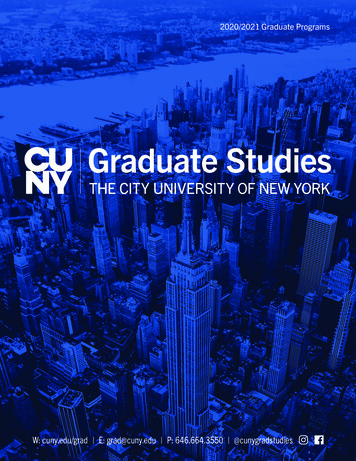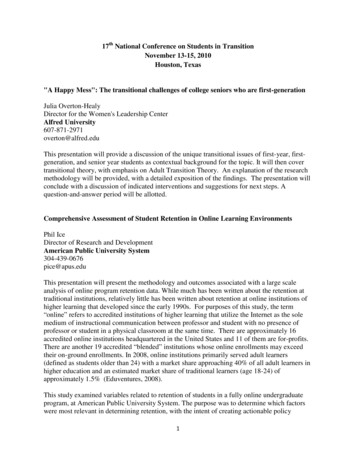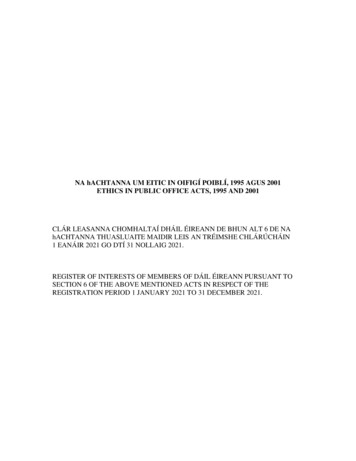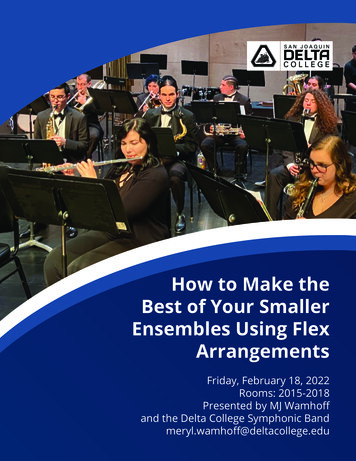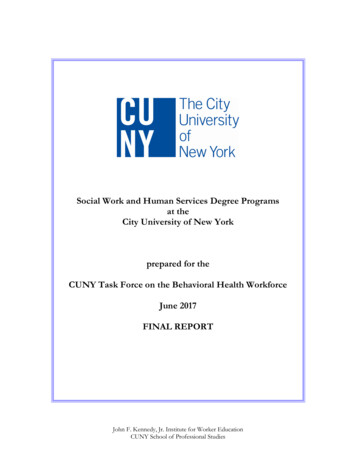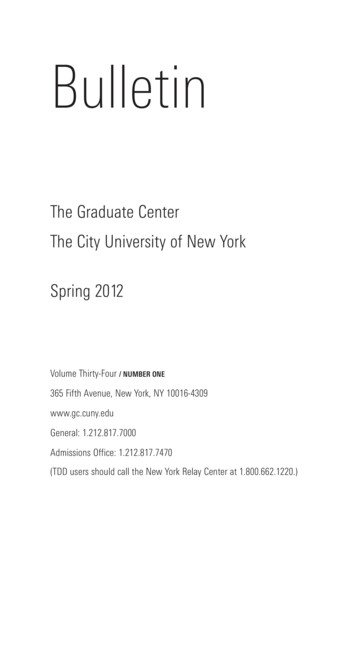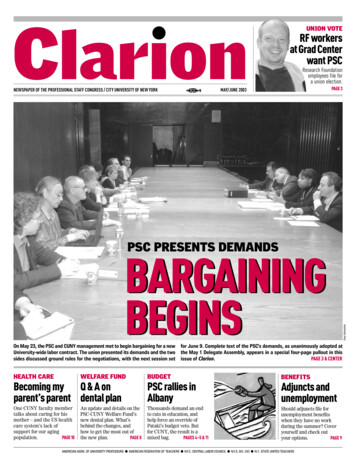
Transcription
ClarıonNEWSPAPER OF THE PROFESSIONAL STAFF CONGRESS / CITY UNIVERSITY OF NEW YORKUNION VOTERF workersatGradCenterwant PSCResearch Foundationemployees file fora union election.PAGE 3MAY/JUNE 2003BARGAININGBEGINSOn May 23, the PSC and CUNY management met to begin bargaining for a new for June 9. Complete text of the PSC’s demands, as unanimously adopted atUniversity-wide labor contract. The union presented its demands and the two the May 1 Delegate Assembly, appears in a special four-page pullout in thisPAGE 3 & CENTERsides discussed ground rules for the negotiations, with the next session set issue of Clarion.BUDGETBENEFITSBecoming my Q & A onparent’s parent dental planPSC rallies inAlbanyAdjuncts andunemploymentOne CUNY faculty membertalks about caring for hismother – and the US healthcare system’s lack ofsupport for our agingpopulation.PAGE 10Thousands demand an endto cuts in education, andhelp force an override ofPataki’s budget veto. Butfor CUNY, the result is amixed bag.PAGES 4–5 & 11Should adjuncts file forunemployment benefitswhen they have no workduring the summer? Coveryourself and check outyour options.PAGE 9HEALTH CAREWELFARE FUNDAn update and details on thePSC-CUNY Welfare Fund’snew dental plan. What’sbehind the changes, andhow to get the most out ofthe new plan.PAGE 8AMERICAN ASSN. OF UNIVERSITY PROFESSORS AMERICAN FEDERATION OF TEACHERS N.Y.C. CENTRAL LABOR COUNCIL N.Y.S. AFL-CIO N.Y. STATE UNITED TEACHERSGary SchoichetPSC PRESENTS DEMANDS
2NEWS & LETTERSClarion May/June 2003UAPC workers fightunfair treatmentBy TOMIO GERONmust accomplish every day. “Supervisors are pushing for unreasonabledeadlines,” one UAPC worker toldClarion. Employees have beencalled for individual meetings withsupervisors about their productivity. Supervisors of some departments, such as programming, haverequired daily meetings with workers to push for higher output.PRODUCTIVITY“They want you to increase productivity, yet they don’t increaseyour pay,” said Robert Booras of theUAPC international department,noting the lack of cost-of-living increases for virtually all employees.“They’re harassing us,” he said.“That’s why 85% voted yes [to theunion].” On April 28, PSC membershand-delivered a letter to management protesting the new productivity quotas, signed by 65 employees.UAPC managers have also unfairly docked workers’ pay, according tothe Unfair Labor Practice complaint.Before the union election, employeesTomio GeronNegotiations continuePSC members at CUNY’s University Applications Processing Center National Labor Relations Act, an(UAPC) are in their fourth month of employer cannot change terms andnegotiations with management for conditions of employment withouta first-time contract. Meanwhile, negotiating with the workers’ union.workers say management has been On April 22, the PSC filed an Unfaircracking down on employees in re- Labor Practice charge against thetaliation for their vote to join the CUNY Research Foundation (RF),which manages the UAPC.PSC in an election last December.In early January, managers beIncensed by management’s retalgan to demand that workers keep iation, UAPC staff have also takendetailed logs of how theydirect action. On Januaryspend the work day, includ- Incensed by9, about 50 employeesing bathroom breaks. One management, marched into UAPC ExUAPC worker told of beingecutive Director Les JaUAPC staffforced to count how manycobs’s office to deliver apages she processes each have alsoletter protesting managehour, a tedious procedure taken directment’s sudden refusal tothat she said actually slowsadjust work schedules toaction.down her work.accommodate classes andOther new policies since the elec- the new work logs. Jacobs refusedtion include a change from voluntary to meet with the workers himself,to mandatory overtime, putting new but his representatives claimed thatrestrictions on use of vacation and they did not know about the worksick time, and ending the past prac- log requirement. Eventually thistice of adjusting workers’ schedules practice was stopped, except in oneso that they could attend classes.department.These unilateral changes are illeManagement has also imposedgal, the PSC has charged: under the new quotas on how much work staffDiana Murakhovskaya, Bernadine Kamwanya and Neil Roberts at a recent lunchtime discussion with PSC officers.were docked 15 minutes of pay ifthey were 15 minutes late – but nowthe UAPC takes away one hour ofpay for 15 minutes of lateness.Workers also face new restrictions on how they can take vacation.The UAPC recently changed themaximum consecutive vacationtime an employee can take to twoweeks. “This is a change in termsand conditions of employment,” saidBooras. “In the past people couldtake three consecutive weeks.”Many PSC members at the UAPCare immigrants and in the past haveused three-week vacations to visitfamily in Africa, South America orEurope, trips they can afford onlyevery two or more years.Management has also started requiring doctor’s notes for workerswho call in sick for just one day. Pre-viously, a note was required onlywhen workers were sick for threedays or more.Booras, who is also on the PSCnegotiating team, said that the unilateral changes are retribution bymanagement for last December’svote. “Definitely, they are a punitiveresponse to the union,” he said.The PSC’s Unfair Labor Practicecharge has gone to the National Labor Relations Board, which is nowcollecting information on the case.Meanwhile, negotiations for acontract continue and the union bargaining team reports slow progress.“It’s going well. It’s taking a littlelonger than I expected,” said Booras.“This is the first time we’re talkingto management on equal terms. It’sthe first time we can influence policies that will affect us.”LETTERS TO THE EDITOR WRITE TO: CLARION/PSC, 25 W. 43RD STREET, FIFTH FLOOR, NEW YORK, NY 10036. E-MAIL: PHOGNESS@PSCMAIL.ORG. FAX: 212-302-7815.TRS transfer system must change I write to recommend changes inthe way the Teachers’ RetirementSystem, the pension system formany us at CUNY, administers theTDA, ASF, and ITHP programs. TheTRS must allow members the flexibility to change future ITHP, ASF,and TDA allocations at any timeduring the year. Currently a member can only change the allocation offuture contributions during specified months, although the changedoes not go into effect immediately.Such inflexibility does not occur inretirement accounts managed by Fidelity or TIAA-CREF.The TRS must also allow members more freedom in transferringfrom one fund to another past contributions and earnings. Currentlysuch a transfer can only be madeover the course of a year in onemonth steps. This straitjacketing ofthe member’s retirement money hasbeen ridiculed in the civil servicenewspaper The Chief and is a sourceof discontent among TRS members.The current transfer system is absurdly archaic.Irvin SchonfeldCity CollegeNo unopposed slates It is nearly impossible to successfully run as the only independentcandidate in an election dominatedby the unopposed 25-member NewCaucus slate.Notwithstanding this disability, Ichose to run for the position of University-wide Officer and earned thevotes of 660 members who selectedeach candidate separately instead ofmerely placing a single “X” in theone slate box that appeared at thetop of the ballot.For these votes I am most grateful, especially since they represented approximately 18% of the effective total vote count in this election(or nearly one out of each five votes).It is ironic that I received many more“non-slate” votes than any one of myfive New Caucus opponents – insome cases up to twice as many!While this does not reward me avictory, it does point up the inherentunfairness of the unopposed slatevote when it is matched against asingle independent candidate.Based upon this experience, Iwould propose the elimination ofunopposed slates in future PSC elections whenever there are one ormore independent candidates. Sucha change in the election rules wouldencourage more independent candidates and thus lead to a more democratic election.Louis AlpertPSC EC member, 2000-2003BCCAdjunct unemployment As a new adjunct grievance counselor for the PSC, I have heard a lotof calls from adjuncts regardingtheir eligibility for unemploymentinsurance (UI) for the summer.Their question turns upon whetheran adjunct is considered to be stillemployed after the Spring semester.The New York State Department ofLabor conducts hearings to determine the issue.The UI hearings between adjunctsand CUNY focus upon the “letterof reappointment” – a letter in theSpring from CUNY reassuring theadjunct of employment (e.g., acourse to teach) in the Fall, subject toseveral conditions (e.g., sufficientregistration). In UI hearings or othertribunals, this is generally referredto as a “letter of reassurance.”Adjuncts who file for UI say thisletter is an illusory promise; CUNYsays the letter is given in good faith.Sometimes the adjuncts win; sometimes CUNY wins. And sometimesthe decision is the result of a defaultby one party or the other (i.e., a decision based on one party’s failure toappear), creating mistaken expectations about the outcome of future UIhearings.What has been your experience?Write and tell me at Michael@Gregorek.com.Michael J. GregorekCity CollegeProblem of 21st century It is amazing how relevant W.E.B.DuBois’s The Souls of Black Folkstill is today, 100 years after its publication as a first-hand observationof African American life in thedecades following the Civil War. AnApril 7 celebration of the book’s100th anniversary, a benefit forTransAfrica Forum hosted by Grad-uate Center’s Center for the Humanities, made clear how “the veil”described by DuBois still lingersover people of color, marking themoff from the white skin privilegegranted in our “democratic” society.Actor Jeffrey Wright broke downwhile reading a passage from “Passing of the First-Born,” Dubois’ account of the death of his two-yearold son, a near-celebration of thechild’s escape from the veil, from thepath of disappointment that hadawaited his life. And when DannyGlover, chair of TransAfrica’sboard, read a passage about endlesswar still determined by the colorline, the audience murmured a quietrecognition. It is, indeed, still theproblem of the 21st century.Glover closed the event with anexpression of concern, in the light ofthe current Iraq war, about possiblefuture attacks on oil-rich countrieson the African continent. One mightadd that the assault of malign neglect inflicted on this continent todate has been at least as deadly.Renate BridenthalBrooklyn College (emerita)Write to ClarionLetters should be no more than 150200 words in length and are subjectto editing.
NEWSClarion May/June 20033Contract negotiations beginBy TOMIO GERONThe PSC and CUNY managementopened negotiations for a new laborcontract on May 23. The PSC presented its demands and the twosides discussed ground rules forbargaining.“Even in a tough fiscal climate, thePSC believes that investment in ourprofessional lives must continue ifCUNY is to thrive,” said PSC President Barbara Bowen, the union’schief negotiator. “The union seeks tocontinue the progress we’ve made inrestoring salaries, improving workplace conditions and rebuilding theUniversity. Much more remains tobe done, and we are ready for serious and productive negotiations.”PSC presents demandsnationally competitive salaries andoutline several ways to addressCUNY’s heavy teaching load. Anumber of proposals aim at winningequity for adjuncts, Higher Education Officers (HEOs) and CollegeLab Technicians (CLTs), library andcounseling faculty, and those inContinuing Education and the Educational Opportunity Centers.Other items address CUNY’s pay-ments to the Welfare Fund, promotions, care for family members,health and safety, intellectual property and more.PSC members had a chance todiscuss the contract proposals directly with the union negotiatingteam in a May 12 open meeting heldat Baruch College. Several members stressed the importance ofwinning equal treatment for libraryThe negotiations follow months ofresearch by PSC negotiators anddiscussion among union members.The PSC’s demands were approvedby the Executive Council on March6 and presented to the Delegate Assembly (DA) two weeks later.Delegates had a month to reviewthe proposals and made a number ofsuggestions that were incorporatedinto the document. With thesechanges, the demands were adoptedby a unanimous vote at the DA’sMay 1 meeting. (The full text appears in a special pullout section inthe center of this issue of Clarion.)The union’s demands emphasizethe need for more progress towardGary SchoichetRESEARCH AND DISCUSSIONChing-Leou Liu, a library faculty member at Hostos, speaks at the May 12 membership meeting at Baruch.faculty in reassigned time and sum- big effect on HEOs, and I’m speakingmer leave. “I do not yet have as one who works 40 to 50 hours atenure,” said Miriam Laskin of the week.”Agreement on a new contract isHostos library. “If I had a regularfaculty schedule, I would have a lot not likely to come quickly, givenmore time to do my research and the unsettled condition of both Cityand State finances. CUNYpublishing. I think this iscrucial for librarians,” she The unionmanagement’s negotiatsaid to strong applause.ing team is directly acseeks toLorraine Cohen, co-chair ofcountable to Chancellorrestorethe PSC Women’s CommitMatthew Goldstein andtee, suggested that such in- salaries,the CUNY Board ofequities in time and leave improveTrustees, but any settlemay stem in part from genment will also need theder discrimination. “How workplacebacking of New York Citymany of the library and coun- conditionsand State, which provideseling faculty are women?”of CUNY’s funding.and rebuild mostCohen asked. “Does thatMost other municipalhave anything to do with the theunions have not yet begunfact that these groups havebargain seriously forUniversity. tobeen under attack ever sincenew contracts. MayorI came to CUNY?” She invited Bloomberg’s demand for 600 millibrary and counseling faculty lion in concessions and his call forto join the Women’s Committee in “productivity” to fund wage intrying to answer these questions. creases have acted as roadblocks in(To contact the Women’s Commit- municipal labor negotiations.tee, e-mail Norah Chase at nchase@At the May 12 meeting, PSC Firstkbcc.cuny.edu, or call 212-354-1252.)Vice President Steve London askedmembers to get involved in pushingDISTANCE LEARNINGfor the best possible contract.At the May 1 DA, Greg Dunkel, a “What we’re putting on this page isHEO at the CUNY Computer Center, what we believe we deserve andlinked the demand for protection what our members have told us isagainst excessive workload for important,” said London. “I can’tHEOs with CUNY’s introduction of promise that we will win on everynew educational technology. “This point. But I can promise that we willis going to be a key issue, because fight very hard – and if we fightthere will be a major expansion of with 20,000 members, then we willdistance learning in this Universi- walk away with a lot of our dety,” Dunkel said. “This will have a mands in the new contract.”Grad Center workers want unionBy KRISTIN LAWLEROn May 16, CUNY Research Foundation employees who work at theUniversity’s Graduate Center fileda request for a union election withthe National Labor Relations Board.A majority of Research Foundation (RF) workers at the GraduateCenter have declared their supportfor the PSC, and organizers expectthe upcoming election to be thenext victory for RF employeesacross CUNY who want union representation.More than 200 people work on Research Foundation lines at the Graduate Center. Most of them do research and administrative supportfor grant-funded projects of everyacademic stripe. A significant number work at the Graduate Center onjobs not directly funded by grants.Many are CUNY graduate students.Tuition reimbursement, job security, and greater leverage in dealingwith the Research Foundation topMajority of RF employees back PSCthe list of demands animating theorganizing drive. “We are organizing because a collective voice willmake the RF accountable to itsworkers,” says Ron Nerio, a Ph.D.candidate in sociology and a grantfunded employee. “I hope tuition remission is something that we canachieve.”TEMPORARY?Because grants are limited in duration, all grant-funded employeesare considered “temporary” – eventhose whose grants are renewedregularly or those who work foryears in Graduate Center administrative offices. Building protectionsfor this kind of so-called temporaryemployment is a priority for GradCenter workers – protections suchas severance packages, a senioritysystem that could help those on defunded grants find new jobs, andcushions to protect benefits be- Grad Center, put it this way: “Alltween projects.CUNY workers, whether they areMany of the RF employees point graduate students, researchers, orout that other workers on campus administrators, need and deserve aenjoy the rights and protections that union to protect their rights in thecome with a union; they sayworkplace.”the PSC has always been a Nearly 7,000In the next few weeks,positive force at the Graduworkers and managementworkersatate Center. “We’re excitedwill discuss what jobsto be joining the same union CUNY arewould be included in thethat many of our colleagues paid onbargaining unit – and thusbelong to,” says Thurstonwho gets to vote. OrganizDomina, a researcher and Researchers hope this phase willgraduate student in sociolo- Foundationmove quickly and that angy who belongs to the orgaelection will be scheduledlines.nizing committee. “By joinin the near future. “Theing together, we hope to improve sooner the better,” says Hillarynot only the quality of our jobs but Webb, a researcher and union acalso the quality of our research, by tivist. “Research Foundation workimproving communication with the ers here are ready to be members ofRF and negotiating away organiza- the PSC.”tional hurdles.”Apparently they’re not alone.Frances Fox Piven, distinguished “The PSC has been receiving callsprofessor of political science at the from all over CUNY,” says MaryAnn Carlese, the union’s AssociateExecutive Director. “There are nearly 7,000 CUNY employees paid onResearch Foundation lines. They’reexpressing a lot of interest in havingPSC representation and a strong,fair contract.”SHADOW WORKThey deserve it, says PSC President Barbara Bowen. “The RF ispart of CUNY’s vast ‘shadow university,’” Bowen says. “Thousandsof unorganized workers do teaching, research, and program development – often exactly the same workas unionized PSC members – butwithout the protection of a unioncontract. It’s time for this gross inequity to end.”The PSC has represented workers at the RF’s central office since1973. And in a December 2002 election, 85% of RF employees atCUNY’s University ApplicationsProcessing Center voted to unionizewith the PSC.
4NEWSClarion May/June 2003State budget mixed for CUNYBy TOMIO GERONWhile CUNY won some reprievesfrom the State budget axe in May,the University is still being hit witha drop in State support and a steeptuition increase.The budget passed by the StateLegislature reverses Governor Pataki’s proposal to cut community college base aid by 345 per full-timeequivalent student. Because of increased enrollment, this meansSenior colleges cut 12.5%State support for CUNY’s community colleges will rise 3.5% to 135.9million, a 4.6 million increase overthe last fiscal year. The final budgetalso overturns the deep cuts Patakiproposed for the Tuition AssistanceProgram (TAP), which helps publicand private university studentsstatewide.CUNY’s senior colleges, however,have been cut by 83.1 million(12.5%) compared to last fiscal year.To close the gap, the Legislature’splan proposes – in effect requires –raising “tuition and other revenue”by 121.5 million. This means imposing a tuition hike at CUNY seniorcolleges of up to 950 per year for instate residents and nearly 5,000 forthose from out of state.“We are pleased with the restorations to the community college budget and opportunity programs andTAP,” said PSC Secretary and Legislative Director Cecelia McCall.“However, we are extremely unhappy that there is no restoration to thesenior college budget. We do not feela tuition increase at CUNY is arestoration.”Peter HognessTUITION HIKEPSC members attended a May 3 Albany rally in support of public education funding.Even before this increase, NewYork’s public colleges were the 14thmost expensive in the country. Overthe past nine years, Pataki has proposed 2.4 billion in cuts to collegesand universities, and CUNY hasseen its State support decline byover 40% since 1990. Earlier thisCity budget still shortMayor rebuffs union plan to avoid layoffsduced pension benefits for new employees. The MLC countered withits own proposals to save moneythrough early retirement incentives,a stretchout of City pension plancontributions, 100 million in healthThose targeted for the next waveof layoffs include almost 1,000teacher’s aides in the public schools.Two-thirds of teacher’s aides areAfrican American or Latino, and theUnited Federation of Teachers hasfiled a lawsuit charging that the cutback plan has a disproportionate impact along racial lines.care savings and a 200 million loanthat the Daily News said would be“virtually interest-free.”The City rebuffed the MLC proposals out of hand, claiming thatthey were worth a mere 20 millionin real savings instead of the 600million asserted by the MLC.But when the MLC proposed thatthe real value of its plan be assessedby a three-member panel – StateComptroller Alan Hevesi, CityComptroller William Thompson anda third person named by the mayor– City representatives said theyweren’t interested.CUNY FUNDSPeter HognessThe City budget was still up in the 10,500 municipal workers, which heair at the end of May, leaving resi- said would have been necessary ifdents wondering about everything the State aid had not come through.from their children’s schools to the But Bloomberg moved ahead withlocal firehouse to the pungent odor over 4,000 layoffs that he insistedof garbage in the summertime.were necessary to fill the City’s reMayor Michael Bloomberg has al- maining budget gap. Over 2,000 cityready laid off over 2,000 city work- workers found themselves joblessers, including drug addicon May 17, with the resttion counselors, foster CUNY funding isslated to be axed incare caseworkers, sanita- maintained, butcoming weeks.tion workers and homeBloomberg rejectedscholarshipsless shelter staff.an appeal from the MuEarlier in the month the are threatened.nicipal Labor CommitState Legislature passed atee (MLC) to “stop theseries of measures that will plug 2.7 clock” on the layoffs while negotiatbillion of the 3.8 billion hole in the ing over the MLC’s cost-saving proCity budget. The package includes a posals. The City and the MLCrise in the City’s sales tax, a City in- (which includes the PSC) sat downcome tax surcharge for individuals to discuss the union plan on May 15earning over 100,000, and a State – but the next day City representatakeover of 500 million a year in tives walked away from the table,City debt service from the 1970s. and the layoffs went ahead.The day after he vetoed the Statebudget, Governor Pataki vetoed the MAYOR’S DEMANDSFor months the mayor has deCity aid package as “another multimillion-dollar tax grab,” but on May manded 600 million in immediate19 both houses of the Legislature money-saving concessions fromCity unions, including longer workvoted for an override.Bloomberg set aside plans for a hours, increased health care pay“doomsday budget” with layoffs of ments, cuts in vacation days and re-year, a study by researchers at Illi- Majority Leader Joe Bruno, a Renois State University found that publican and close Pataki ally, joinNew York spends less on public ing with Assembly Speaker Sheldonhigher education than 46 other Silver in an override vote. It was Alstates, in proportion to per capita in- bany’s first override of a budget vecome.to since 1982.CUNY Chancellor Matthew Goldstein has opposed a 950 tuition in- SALES AND INCOME TAXThe Legislature’s budget meacrease as too costly, and has said hewill aim for a lower figure. CUNY of- sures include a 0.25% rise in theficials have not commented on State sales tax and an income taxsurcharge on individualswhether they will raise tuearning over 100,000 aition at community col- The adoptedyear. A total of 1.9 billionleges. A tuition increase for budgetwas restored to MedicaidCUNY graduate programsmeans aand education funding.is also possible.Unions have been activeThe State budget for 950 seniorin the campaign to restoreCUNY is part of an Assemcollegefunding to State services –bly-Senate budget passedrallying in Albany (see facover Pataki’s vocal objec- tuition hikeing page), lobbying, andtions. Unable to reach is possible.ripping Pataki in televisionagreement with the governor on how to cover an 11.5 billion ads. The efforts seem to have madebudget gap, the Legislature crafted an impact, helping stave off many ofa budget of its own. While the gov- the proposed cuts.Pataki’s approval ratings droppedernor was willing to increase salestaxes, raise CUNY and SUNY tuition to 37% – almost his lowest ever – asand introduce new forms of gam- the budget crisis came to a head, acbling, he dug in his heels against any cording to a Marist College poll intax increase on upper-income New May. Voters said they were againstPataki’s handling of budget issues,Yorkers.Pataki’s May 14 veto thus led to with 56% opposing his veto and onlythe extraordinary sight of Senate 26% backing the move.As many as 30,000 people attended an April 29 rally against city budget cuts sponsored by DC 37, the union that is most heavily affected by city layoffs.While the drama of the layoffsheld center stage, the City CouncilHigher Education Committee heldhearings on Bloomberg’s proposedbudget for CUNY for the 2003-2004fiscal year. The mayor has proposedmaintaining direct City support forCUNY at its current level of 124million, essentially doing the minimum required by the State’s “maintenance of effort” law for fundingCUNY’s community colleges.However, Bloomberg has onceagain proposed elimination of thePeter F. Vallone Scholarship Program, which provides 5.5 million intuition aid for NYC high schoolgraduates who maintain at least a Baverage at CUNY. Last year moneyfor the scholarships was restored bythe City Council, in large part due tolobbying by PSC members.The mayor also wants to slash 124,000 from the Hunter CampusElementary and High Schools andanother 2.7 million from CUNY’sadult literacy efforts and variousUniversity administrative costs.The Council will vote on the bud–TGget sometime in June.
NEWSClarion May/June 20035May 3 rally in Albanyback. One of my students is on thisbus and he’s totally TAP. With a tuition increase, it’s going to be hardfor him to stay in school.”Also on the Brooklyn College buswas Yvonne Armstrong of theNAACP’s NY branch. “The CentralLabor Council told us about the rally,” she said, “and we came for thechildren in the public schools. InNYC now, the system is in disarray.”Hundreds of buses converged onAlbany, including 16 from the PSC.With the demonstration coming atthe end of the semester, chapters of-By CLARION STAFFOn May 3, thousands of peoplecame to Albany to demand supportfor public education, from pre-Kthrough post-grad. Opposing thedeep cuts proposed in GovernorPataki’s budget, they filled the plazain front of the State Capitol.“Look around you,” PSC President Barbara Bowen told protesters.“This is what power looks like! Let’smake this the beginning of a people’s movement to reverse the history of inadequate and unequalfunding of education in this state.”The protest was organized by abroad coalition of teacher unions, local school boards, PTAs, college student clubs and community groupslike ACORN and the Campaign forFiscal Equity. New York State United Teachers (NYSUT), the PSC’sstate affiliate, played a central role.ten found that mobilizing was achallenge. The most successful wasprobably City Tech, which sent acontingent of 90 people.ACTIVISTS GET THE CREDIT“I was stunned when I saw thenumbers,” said PSC Chapter ChairBob Cermele. “I wish I could takepersonal credit, but I can’t. We hadsome very active activists in thecontinuing ed division who reallyturned people out.”NYSUT put the entire crowd at40,000, and it was one of the largestthat many politicians present hadever addressed. The timing was ideal, coming just after the State Legislature had voted for a budget restoring many of Pataki’s cuts, but beforethe governor’s veto (see p. 4).Terry Parker said that the timingand the turnout had a real impact.“When I left Albany, I was wondering if the legislators would followthrough on their credo of a veto, because politicians never followthrough on their promises,” he said.“But they did. I think we got them todo what was right.”UPSTATE & DOWNThe PSC contingent carried signs that read, “Invest in CUNY, Invest in New York.”Battle over rent rulesBy MICHAEL McKEETenants & Neighborsand PETER HOGNESSCUNY faculty and staff are caught inthe scissors between sub-standardsalaries and New York City’s skyhigh housing prices. The cost ofhousing in NYC is a key obstacle torecruiting new faculty, and manyPSC members are only able to live inthe city thanks to rent regulation.Tenant groups estimate that over4,500 PSC members live in buildingswith rent stabilization or rent control, and State rent laws are due toexpire at midnight on June 15.But a simple renewal of the lawsin their current state would meanthe continuing phaseout of rent regulation and its eventual demise.Every year more units are removedfrom rent regulation through various loopholes. If the laws are notstrengthened, there will be fewerLabor board upholdsPSC’s right to representThe PSC
Brooklyn College (emerita) 2 NEWS & LETTERS Clarion May/June 2003 TRS transfer system must change Write to Clarion Letters should be no more than 150-200 words in length and are subject to editing. LETTERS TO THE EDITOR WRITE TO: CLARION/PSC, 25 W. 43RD STREET, FIFTH FLOOR, NEW YORK, NY 10036. E-MAIL: PHOGNESS@PSCMAIL.ORG. FAX: 212-302-7815.
